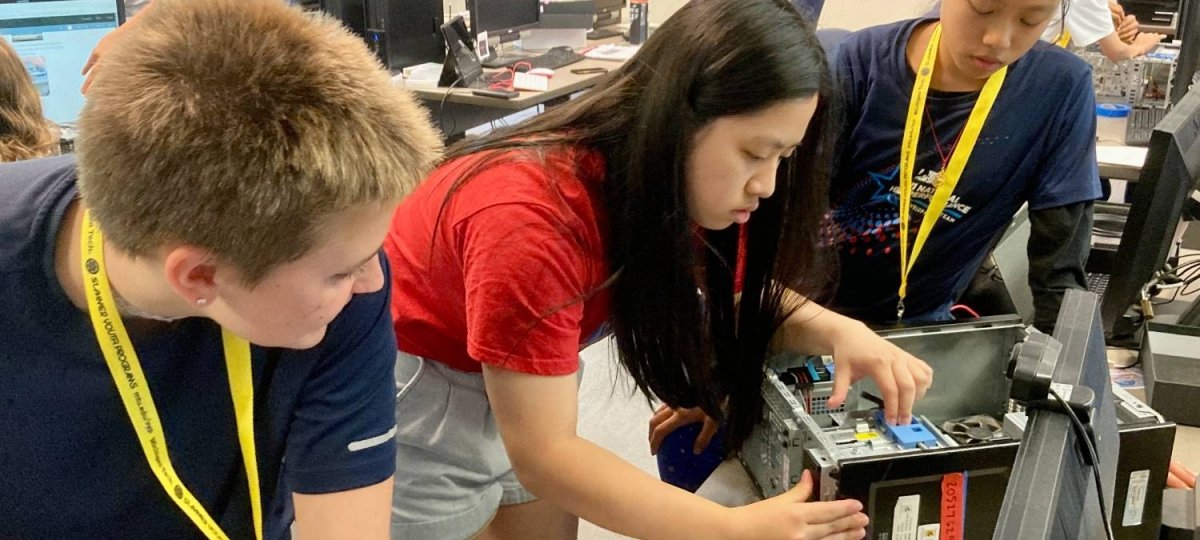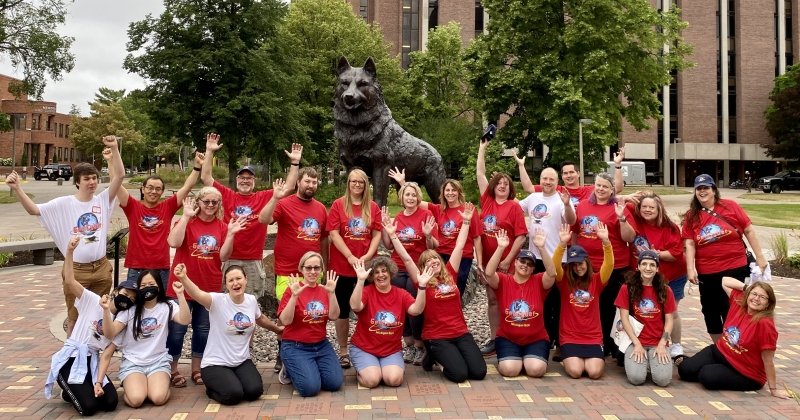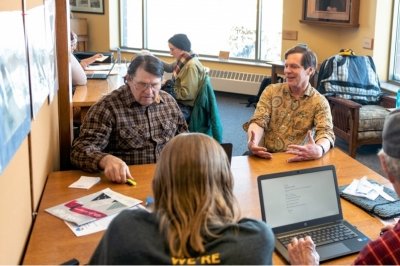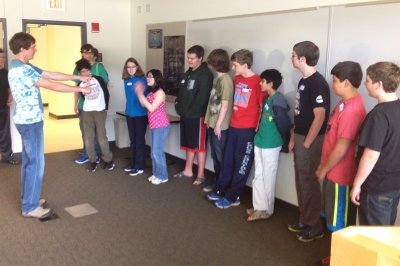Outreach and helping others are longtime priorities for College of Computing faculty, staff, and students. From hands-on youth learning experiences and building digital literacy in adults to people-centric research and staying in touch with the needs of industry, our passion for computing drives us to get out of the classroom and into the community.
College Outreach Programs Serve Diverse Audiences
As the digital revolution continues to transform our society, many older adults and other groups are being left behind. To help close this knowledge gap, on Saturday mornings during the academic year a group of Michigan Tech students and faculty can be found at the Portage Lake District Library, Houghton.
They’re with the Department of Computer Science’s outreach program, BASIC—Building Adult Skills in Computing. Now in its 11th year, BASIC provides tutoring to technological newcomers and others looking to expand their digital skills.
Michigan Tech students benefit from the program, too. Student Mitchell Eckstrand has been a BASIC tutor for several years. He says, “If I can do my part to help other people feel more comfortable with their devices or other tasks that they’re doing on their computer, then it’s rewarding for me.”
Since 2011, Copper Country Coders has given middle and high school students a low-stakes, fun opportunity to gain programming experience and build a broader view of how computer science fits in with life and career. Started by faculty members, for several years the outreach has been led by undergraduate students.
The Tech students are fully in charge of the program, from identifying the classes they’ll teach to drawing up lesson plans and conducting the classes to end-of-semester reflections about how they can improve. The undergraduates build communication, teamwork, and leadership skills while reinforcing their understanding of the concepts they are teaching to the students.
“Being a part of Coders meant a lot to me,” says student Laura Albrant, who was Copper Country Coders president in 2021-22. “It taught me the value of patience and positive reinforcement, and I felt like I was giving back to the local community. I also made many friends with fellow student leaders/teachers.”
Young women, too, don’t always have opportunities to learn about computing careers or to meet role models in the field. And without that, many don’t gain the background they need to consider computing as a career.
To change that, since 2000, the Women in Computer Science (WiCS) Summer Youth Programs (SYP) exploration has reached dozens of high school girls with the message that computing careers are for women, too.
Organized by Linda Ott and the computer science department, WiCS helps young women learn more about computing and the opportunities it offers.
Another summer camp experience—GenCyber— reaches out to K-12 students and teachers. The grant-funded program helps participants understand safe on-line behavior and learn fundamental cybersecurity concepts, also serving to increase interest in cybersecurity careers and share teaching methods for delivering cybersecurity content in K-12 curricula. The GenCyber camps are managed by the applied computing department and SYP, and presented by faculty and students.
"I love to help other students, and I believe that tutoring them also reinforces my skills and techniques."
College outreach also happens on campus. Open to all Michigan Tech students in computing classes, student tutors in the College of Computing Learning Center (CCLC) help their fellow students succeed through free one-on-one help sessions.
“I consider this an opportunity to strengthen my communication and leadership skills,” says computer science major Xiaojie Chen, a CCLC coach. “I love to help other students, and I believe that tutoring them also reinforces my skills and techniques.”
Also on campus, CyberCorps: Scholarship for Service (SFS), a five-year, $3.3 million project funded by the National Science Foundation, will fund scholarships for 20 students. The program provides up to three years of full scholarship support for undergraduate and graduate students studying cybersecurity at Michigan Tech. The cross-disciplinary SFS program is coordinated and conducted by multiple departments and faculty across campus.
SFS student Thad Sander, cybersecurity, says of the SFS the program, “This opportunity means a lot. It gives me the funds to focus on my education instead of juggling a job at the same time.”
Keeping up with industry changes is also critical to preparing students for careers in today’s constantly changing workplace. College and department advisory boards meet regularly to advise leadership on topics including academic success, job readiness, and making sure program curricula are up to date.
And finally, the Computing[MTU] Showcase, presented annually by the College of Computing and the Institute of Computing and Cybersystems (ICC), reaches out to campus and community to share the success and initiatives of researchers, students, and alumni. Activities include lectures, workshops, discussion panels, a poster competition, networking opportunities, and more. Our next Computing[MTU] Showcase is in October 2023.
BASIC—Building Adult Skills in Computing
Digital literacy. It’s the ability to use technology to find, evaluate, and apply information. If you’re digitally literate, you can effectively operate whatever device or technology you’re using to gather the information you need.
For younger generations, digital literacy seems to come naturally. For many older adults, however, using computers, smartphones, and other digital devices remains unfamiliar territory and can be a source of great anxiety.
Since 2011, Michigan Tech students and faculty have been helping older adults break down these digital barriers through Building Adult Skills in Computing (BASIC), a free weekly tutoring program at Portage Lake District Library, Houghton.
“Even if you design technology well, you still need to have supports in place to help people learn to be confident users,” says Charles Wallace, associate professor of computer science.” If people aren’t confident, they’re not going to be willing to explore and figure it out.”
“Many in the technology world haven’t realized that simply being older might cause accessibility issues,” he says, “and that’s what we’re addressing.”
Led by Wallace and Kelly Steelman, chair and associate professor, cognitive and learning sciences, BASIC tutors use a “let’s figure it out together” approach, making BASIC a comfortable, safe spot for people to ask questions and feel empowered to seek out answers.
Steelman and Wallace are studying the techniques of the most effective BASIC tutors—including both Michigan Tech professors and students—to reduce anxiety, encourage exploration, and boost confidence.
They plan to use the results of their research to develop software that will work in tandem with other tutoring programs to help support development of digital literacy.
The Past, Present, and Future of Computing
“Every discipline is being disrupted by computing. Every discipline is deeply connected and advanced by computing. The College of Computing is making sure that all of our colleagues, programs, and students across campus, are staying ahead of that transformation,” said Dennis Livesay, Dave House Dean of Computing, at the start of a panel discussion at the opening event of the Computing[MTU] Showcase in April 2022.
![im Havens, Dennis Livesay, Dan Fuhrmann, and Dave House at the Computing[MTU] Showcase in April 2022.](/computing/gateway/2022/stories/participation/images/showcase-history-panel-12x5-card400.jpg)
The panel, “The Past, Present, and Future of Computing at Michigan Tech,” engaged distinguished alumni and faculty in a conversation exploring the ever-increasing role of computing in everyone’s lives and where it is headed next.
“The computer industry’s dream has always been to make computing invisible, to make it like the air we breathe,” said alumnus and major donor Dave House ’65. “It’s necessary for life but we don’t think about it. We do that by making it more capable and more human-centric.”
What stands out to Eric Roberts ’93 is that the College of Computing is evolving in real time. He says, “I completed my mechanical engineering degree with almost no programming. You can’t do that today. It’s an ingredient of your degree.”
Roberts, director of the Traverse City, Michigan, business incubator 20Fathoms, added that in the start-up space, you better know computing. “Your business is going to touch computing. It doesn’t really care if you’re a mechanical, biomedical engineer, or electrical engineer.”
“Having managed large teams of engineering professionals, it’s amazing the degrees that people have,” said House. “There are a lot of computer engineers, electrical engineers, and computer scientists, but you also see astronomers, mathematicians, and philosophers. They earned their way into the system.”
"You can build a diverse team, but if you don’t build an inclusive team, you’ve wasted your time."
“And the system is craving that level of diversity and that approach from different areas and perspectives,” said Christine Roberts ’91, senior vice president and general manager at Poly. “Because everybody comes at a problem from a different direction, it actually makes it better, faster, stronger when we have folks from all the different areas.”
But we need to do it well. “Knowing how to do computing well is why we need the College of Computing,” said Linda Ott, professor and emerita chair of the Department of Computer Science.
“A lot of people dabble in programming, but it’s really important that as a University we recognize that there is a discipline behind all of this, that there is value in doing it right,” Ott said.
And we need to pay attention to the ethical and security aspects. “It’s not ‘Can we build it?’ It’s ‘Should we build it?’” said Christine Roberts. “I think that’s a really important key to everything.”
“Computing is ubiquitous and everyone’s using it, but we’re not always aware of all the less visible things that are going on,” noted Dan Fuhrmann, Department of Applied Computing chair.
“That’s why we have so many cybersecurity job openings. People need to understand those security issues,” said Fuhrmann. “When we say computing’s like the air we breathe, we have to make sure the air is not poisonous.”
And there’s another contemporary conversation concerning the role of a public university. “It’s to create well-educated citizens who can be a part of a well-informed society,” said Fuhrmann. “That has been part of the vision for public universities for a hundred years or more. Helping individuals become good citizens is also an important component of higher education.”
What does the future have in store? “Today’s computing is going the same place that computing of the past has gone. It’s going to be obsolete,” said House.
Whatever computing issues become relevant in the future, learning to solve problems and think deeply will be key.
“We’re now educating the next generation who will move into the computing space,” said Fuhrmann. “One of the things I would love for us to stress is how this new generation can change the world.”
Copper Country Coders Share Computing with Youth
“There is a nationwide lack of computing curriculum in middle and high schools,” says Charles Wallace, associate professor of computer science. “I saw this gap locally and several years ago I started to teach some free after-school coding classes at Houghton Middle School, where my son was attending.”
“In programming, perseverance is more important than super smarts,” says Wallace. “It’s about problem-solving and getting through that process. When it works, when students understand that this is something they can do, it’s super exciting to them. Copper Country Coders gives youth a low-stakes, fun opportunity to get some programming experience and offers a broader view of how computer science fits in with life and the kinds of career options that are out there.”
Wallace conducted the classes on his own for a couple of years, then computer science faculty member Leo Ureel got involved. “We wanted to help students over a barrier of perception that computer science and robotics is something only ‘brainiacs’ can do,” Ureel says.
Soon, Wallace and Ureel started recruiting Michigan Tech students to instruct the youth classes. “Giving Tech students the opportunity to work as educators is as important a goal as teaching the middle and high school students,” Wallace notes.
Now, with Wallace and Ureel as advisors, the Tech students are fully in charge of the program, from identifying the classes they’ll teach to drawing up lesson plans and conducting the classes to end-of-semester reflections about how they can improve the classes in the next semester.
Jacob Wysko ’24, a geospatial engineering major with a minor in computer science, has been a Copper Country Coders instructor for two years. “It has been an extremely rewarding experience teaching a subject I’m passionate about to an eager group of students,” he says. “I’ve gained more education and leadership skills by having taken on this opportunity, and I have contributed to computer science education in our area.”
Computer Science major Laura Albrant participated in CC Coders for three years, last year as president of the student organization. “Being a part of Coders meant a lot to me,” she says. “It taught me the value of patience and positive reinforcement, and I felt like I was giving back to the local community. I also made many friends with the fellow student leaders/teachers.”
Albrant loved teaching the Copper Country Coders classes, as she could teach what she wanted to teach and make it fun. “The more fun the kids had, the more fun I could have,” she says. “It was also extremely satisfying when a student would correct my own programming mistakes, made either on purpose or by accident. To me, that meant they were learning, paying attention, and comfortable enough to call me out.”
External Advisory Boards
College of Computing external advisory boards, composed of industry leaders and distinguished alumni, share open and honest feedback about the quality of the College's academic programs and other scholarly activity. Essential for continuous improvement and required by undergraduate program accreditation bodies, this input ensures that College programs remain relevant and in keeping with current industry needs and expectations.
“The College’s External Advisory Board helps me think about where we’re going over the next five to 10 years and helps us make strategic connections,” says Dean Dennis Livesay. “Recently we’ve discussed high-level topics including ‘What does being an industry engaged University and/or College look like?’ and ‘How do we ensure the professional success of our graduates?’”
“The key word here is advisory,” adds Livesay. “Unlike corporate boards, the role of the advisory board members is to be consulted and make recommendations.”
Department Chair Dan Fuhrmann explains that the two applied computing industrial advisory boards evaluate proposed curriculum updates and offer recommendations to ensure their relevance to industry needs. They also share advice on department leadership, organization, and processes.
Advisory board members also perform a valuable service by acting as judges for projects in the Senior Design and Enterprise programs.
“We also look to board members for advice on gaining financial support for our activities, such as capstone design projects, and in some cases the board members represent companies that are providing this financial support,” says Fuhrmann.
Michigan Technological University is an R1 public research university founded in 1885 in Houghton, and is home to nearly 7,500 students from more than 60 countries around the world. Consistently ranked among the best universities in the country for return on investment, Michigan's flagship technological university offers more than 185 undergraduate and graduate degree programs in science and technology, engineering, computing, forestry, business, health professions, humanities, mathematics, social sciences, and the arts. The rural campus is situated just miles from Lake Superior in Michigan's Upper Peninsula, offering year-round opportunities for outdoor adventure.








